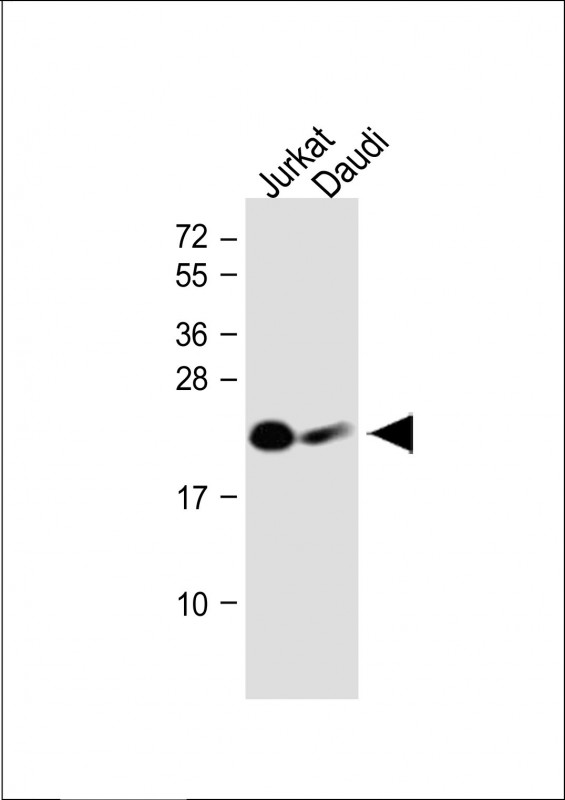
| WB | 咨询技术 | Human,Mouse,Rat |
| IF | 咨询技术 | Human,Mouse,Rat |
| IHC | 咨询技术 | Human,Mouse,Rat |
| ICC | 技术咨询 | Human,Mouse,Rat |
| FCM | 咨询技术 | Human,Mouse,Rat |
| Elisa | 咨询技术 | Human,Mouse,Rat |
| Aliases | Natural cytotoxicity triggering receptor 3, Activating natural killer receptor p30, Natural killer cell p30-related protein, NK-p30, NKp30, CD337, NCR3, 1C7, LY117 |
| Entrez GeneID | 259197 |
| WB Predicted band size | 21.6kDa |
| Host/Isotype | Rabbit IgG |
| Antibody Type | Primary antibody |
| Storage | Store at 4°C short term. Aliquot and store at -20°C long term. Avoid freeze/thaw cycles. |
| Species Reactivity | Human |
| Immunogen | This NCR3 antibody is generated from a rabbit immunized with a KLH conjugated synthetic peptide between 31-65 amino acids from the human region of human NCR3. |
+ +
以下是关于NCR3 (N-Term)抗体的3篇参考文献,包含文献名称、作者及摘要概括:
---
1. **文献名称**:*"Targeting NKp30 (NCR3) in cancer: Dual role of the receptor in tumor escape and immune activation"*
**作者**:Delahaye, N.F., et al.
**摘要**:该研究探讨了NKp30(NCR3)在肿瘤微环境中的双重作用,发现其不同剪切变体通过结合肿瘤分泌蛋白调控NK细胞功能。研究中使用了针对NCR3 N端表位的抗体,验证了其在识别特定亚型中的作用,并揭示了抗体介导的NK细胞激活对肿瘤免疫治疗的潜在价值。
---
2. **文献名称**:*"Functional characterization of anti-NCR3 monoclonal antibodies for modulation of natural killer cell cytotoxicity"*
**作者**:Pogge von Strandmann, E., et al.
**摘要**:作者开发了针对NCR3 N端的单克隆抗体,通过体外实验证明这些抗体可特异性增强NK细胞对肿瘤细胞的杀伤能力。研究还表明,抗体结合NCR3的N端区域能够阻断肿瘤来源的抑制性配体相互作用,从而逆转免疫抑制微环境。
---
3. **文献名称**:*"NCR3/NKp30 isoforms and their ligands: Biomarkers for cancer prognosis?"*
**作者**:Sivori, S., et al.
**摘要**:该研究分析了NCR3的三种剪切变体(α、β、γ)在癌症患者中的表达差异,并利用NCR3 N端特异性抗体进行检测。结果显示,N端抗体能区分不同变体,且特定变体的高表达与患者生存率显著相关,提示其作为预后生物标志物的潜力。
---
**备注**:若需具体文献链接或补充更多研究,可提供更详细的关键词或应用场景(如癌症、感染性疾病等)。
The NCR3 (N-Term) antibody targets the N-terminal region of Natural Cytotoxicity Triggering Receptor 3 (NCR3), also known as NKp30. a critical activating receptor expressed primarily on natural killer (NK) cells. NCR3 belongs to the natural cytotoxicity receptor (NCR) family, which includes NKp30. NKp44. and NKp46. and plays a pivotal role in NK cell-mediated immune responses. NKp30 interacts with ligands such as B7-H6 on stressed or infected cells, dendritic cells, and certain tumor cells, facilitating NK cell activation, cytotoxicity, and cytokine production. This receptor is essential for immune surveillance against malignancies, pathogens, and immune regulation.
The NCR3 (N-Term) antibody is widely used in research to study NK cell function, ligand interactions, and signaling pathways. It helps detect NCR3 expression via techniques like Western blotting, flow cytometry, and immunohistochemistry, enabling insights into its tissue distribution and activation states. Studies utilizing this antibody have contributed to understanding NCR3's role in cancer immunity, infectious diseases (e.g., viral infections), and immune dysregulation disorders. Its specificity for the N-terminal domain ensures recognition of full-length or truncated variants, aiding in functional studies of receptor-ligand binding and downstream effects. This tool is vital for exploring therapeutic strategies targeting NK cell activity in immunotherapy and disease models.
×